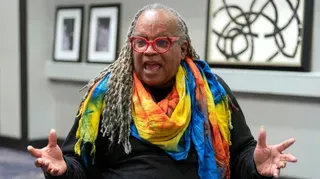February 13, 2014
Tenants Demand Eviction Relief
Kilian Melloy READ TIME: 4 MIN.
Concern over increasing rental costs and a spike in evictions led more than 300 tenants and their supporters to pack a school lunchroom last weekend as the Citywide Tenants Convention sought to harness frustration into political action.
The convention was a culmination of several smaller gatherings that have taken place in San Francisco neighborhoods, including the Castro, over the past month. At those meetings, ideas for a possible November ballot measure have been discussed, but there's no word yet on a specific proposal.
Underscoring the importance of the February 8 confab at the Tenderloin Community School - and housing issues in general - five members of the Board of Supervisors were in attendance.
Participants spent time brainstorming about how to stem the rising number of tenant buyouts and evictions, including those done under the Ellis Act, a state law that allows landlords to get out of the rental business. The problem, as many housing activists see it, is that such properties are usually sold to developers and converted into condominiums.
A giant map pinpointing Ellis Act evictions was on display in the front of the room. Hundreds of arrows illustrated how many such evictions have occurred across the city in recent years. According to housing activists, the escalating rents spurred on by the tech boom have forced many evictees out of the city or into homeless shelters. LGBT seniors, the disabled, and people of color have been particularly hard hit by the wave of evictions, they said.
"Rents have increased by 72 percent since 2011," said Ted Gullickson, director of the San Francisco Tenants Union. "Ellis Act evictions have quadrupled, up 140 percent from last year. There are five buyouts to each Ellis Act eviction. Buyouts are up 140 percent since last year."
When a buyout occurs, the tenant accepts a flat offer from the landlord to vacate the premises. Such deals are brokered outside the parameters of Ellis Act regulations, which means a tenant might accept less than the $3,000 to $5,000 payment as required by law when Ellis is invoked. Supervisor David Campos recently introduced legislation that would require landlords who use the Ellis Act to pay tenants more money to relocate.
Speakers included Gum Gee Lee, 74, who's family made headlines last fall when she, her 80-year-old husband, and their disabled 48-year-old daughter were evicted from the Lower Nob Hill apartment they had lived in for more than 30 years. Thanks to the intervention of Mayor Ed Lee (no relation) and housing activists, the Lees were able to get several extensions on their eviction until a subsidized unit for them could be found. Lee spoke in Chinese through an interpreter.
"Our ordeal lasted 18 months," she said. "It was a time of stress. I couldn't eat or sleep. Is this how I was going to spend my last days? I was able to stand up because the community stood up with me. We need to stick together and fight." The audience applauded.
Blanca Reyes, who's lived in her Mission district unit for 24 years, spoke in Spanish through an interpreter. She said she was given two months to move.
"I am another victim of eviction," she said. "This crisis is impacting me and my family - my daughter is in college and can't focus on her schoolwork. I'm a caregiver for 14 elders. I need to show up with a smile, but I can't because I'm constantly stressed. I want to tell Mayor Ed Lee and other elected officials that they need to stand up for us."
Chandra Reddick is a 10-year resident of 1049 Market, a building populated by low-income artists, all of whom are facing eviction. "We are tired of the racist, sexist, homophobic, classist eviction agenda," she said. Attendees roared in approval.
Tyler McMillian of the Eviction Defense Collaborative said his group handles 2,000 cases per year.
"Our current laws have failed to protect tenants in their homes," he said. "There's a myth that it's hard to evict tenants. Today we fight back against that myth. We need to write better laws to help people to stay in their homes."
At the conclusion of the speeches, attendees broke up into groups in order to brainstorm how they can best combat the evictions. Groups were conducted in English, Spanish, and Chinese and the meetings lasted for about an hour.
After the sessions, Gen Fujioka, a civil rights attorney with the Asian Law Caucus, outlined the basic goals of the convention: take on the Ellis Act in Sacramento; get the city to do more to protect rental housing and call upon the Board of Supervisors to advance that policy agenda; and tenant resistance.
In addition to Campos, supervisors who attended the convention included board President David Chiu and members Malia Cohen, John Avalos, and Jane Kim.
There were some stories of tenants who successfully fought back when faced with an Ellis Act eviction.
Three tenants, Marla Knight, Ian Couley, and Jo Tom, all of whom who reside in a North Beach apartment, had been facing eviction. They and their neighbors fought back and saw their eviction rescinded.
"Get educated," they advised the crowd. "Know what the Ellis Act is."
The trio received a standing ovation.
There will be a Tenants March across the city on March 15. On February 18, housing activists will march in Sacramento to demand that state lawmakers do more to stem the tide of evictions.
Kilian Melloy serves as EDGE Media Network's Associate Arts Editor and Staff Contributor. His professional memberships include the National Lesbian & Gay Journalists Association, the Boston Online Film Critics Association, The Gay and Lesbian Entertainment Critics Association, and the Boston Theater Critics Association's Elliot Norton Awards Committee.



